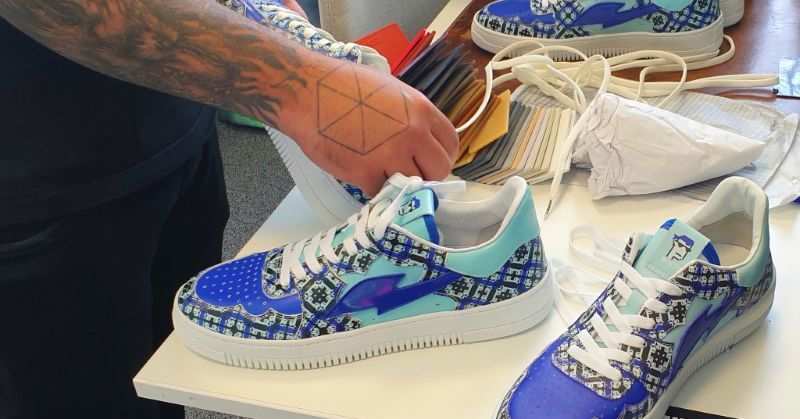

Folks care what their avatars are carrying.
When the digital world Decentraland stated in June customers might make and promote their very own clothes for avatars to put on on the positioning, Hiroto Kai stayed up all night time designing Japanese-inspired clothes.
Promoting kimonos for round $140 every, he stated he made $15,000-$20,000 in simply three weeks.
Whereas the concept of spending actual cash on clothes that doesn’t bodily exist is baffling to many, digital possessions generate actual gross sales within the “metaverse” – on-line environments the place folks can congregate, stroll round, meet buddies and play video games.
Digital artist and Japan-enthusiast Kai’s actual identify is Noah. He is a 23-year-old dwelling in New Hampshire.
After making as a lot in these three weeks as he’d earn in a yr at his music retailer job, he stop to change into a full-time designer.
“It simply took off,” Kai stated.
“It was a brand new strategy to categorical your self and it is strolling artwork, that is what’s so cool about it… When you’ve got a chunk of clothes, you may go to a celebration in it, you may dance in it, you may exhibit and it is a standing image.”
In Decentraland, clothes for avatars – often called “wearables” – will be purchased and offered on the blockchain within the type of a crypto asset known as a non-fungible token (NFT).
Kai’s kimonos embrace beautiful crushed blue velvet items with golden dragon trim.
NFTs exploded in recognition earlier this yr, as speculators and crypto lovers flocked to purchase the brand new sort of asset, which represents possession of online-only objects comparable to digital artwork, buying and selling playing cards and land in on-line worlds.
The area of interest crypto property are additionally capturing the eye of a few of the world’s largest style corporations, eager to affiliate themselves with a brand new era of players – though most of their forays up to now are for advertising.
LVMH-owned Louis Vuitton launched a metaverse sport the place gamers can gather NFTs, and Burberry has created branded NFT equipment for Blankos Block Celebration, a sport owned by Legendary Video games. Gucci has offered non-NFT clothes for avatars inside the sport Roblox.
“Your avatar represents you,” stated Imani McEwan, a Miami-based style mannequin and NFT fanatic. “Principally what you are carrying is what makes you who you’re.”
McEwan reckons he has spent $15,000 to $16,000 on 70 NFT wearable objects since January, utilizing revenue from cryptocurrency investments. His first buy was a bitcoin-themed sweater and he not too long ago purchased a black beret designed by his good friend.
SELFIE SHOPPING
The general measurement of the NFT wearables market is tough to ascertain. In Decentraland alone wearable gross sales quantity totalled $750,000 within the first half of 2021, up from $267,000 in the identical interval final yr, in keeping with NonFungible.com, an internet site which tracks the NFT market.
Some proponents say wearables and buying in digital retailers may very well be the way forward for retail.
“As an alternative of scrolling by a feed and buying on-line, you may have a extra immersive model expertise by exploring a digital area – whether or not you’re buying to your on-line avatar or shopping for bodily merchandise that may be shipped to your door,” stated Julia Schwartz, director of Republic Realm, a $10 million digital actual property funding automobile which has constructed a shopping center in Decentraland.
For NFT lovers, on-line style doesn’t substitute bodily purchases.
However Paula Sello and Alissa Aulbekova, co-founders of the digital style start-up Auroboros, say it may very well be an environmentally-friendly various to quick style.
Clients can ship Auroboros a picture of themselves and have clothes digitally added for 60 kilos ($83) to 1,000 kilos.
Sello argued that the digital garment idea might restrict the waste of customers shopping for garments to put on on social media, citing a 2018 Barclaycard research which discovered 9% of British consumers have purchased garments for social media pictures, then returned them.
“We have to have the shift now in style. The trade merely can not proceed,” stated Sello.
Digital sneaker firm RTFKT sells restricted version NFTs representing sneakers which will be “worn” in some digital worlds or on social media through a Snapchat filter.
“It actually took off when COVID began and a great deal of folks went extra on-line,” stated Steven Vasilev, RTFKT’s co-founder and CEO.
The corporate has posted $7 million of gross sales, with restricted version sneakers promoting in auctions for $10,000-$60,000, he stated. Whereas the vast majority of prospects are of their 20s and 30s, some are as younger as 15.
RTFKT’s NFTs may also be used as a token to get a free bodily model of the shoe, however one in 20 prospects don’t redeem that token.
“I did not do the redemption stuff as a result of I could not be bothered,” stated Jim McNelis, a Dallas-based NFT purchaser who based NFT company, nft42.
“I attempt to keep away from the bodily stuff as a lot as doable.”
FbTwitterLinkedin






